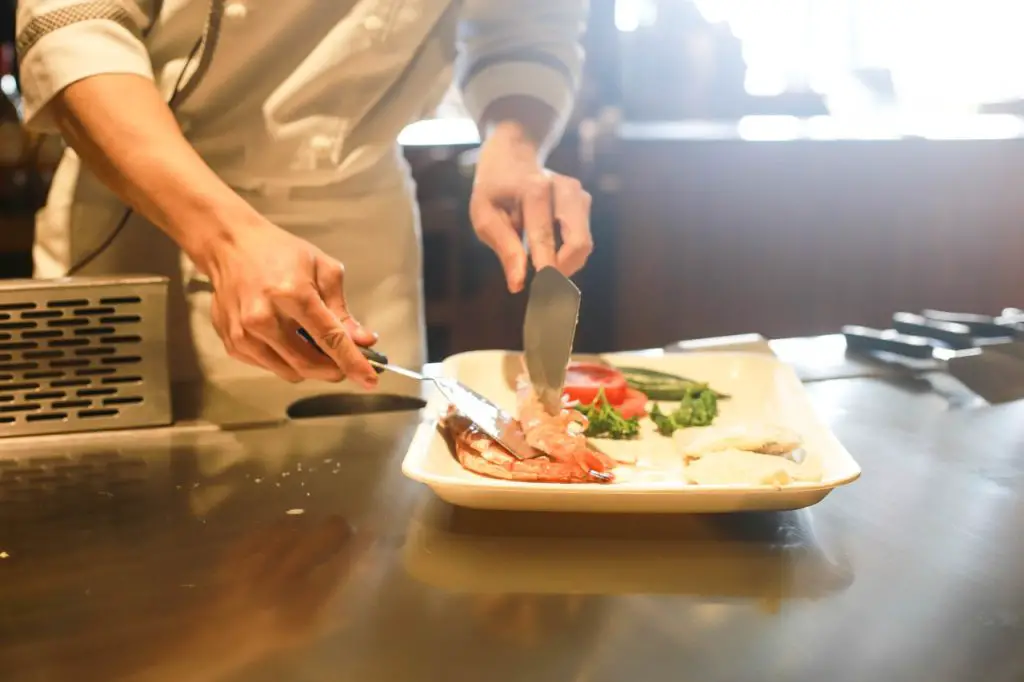Cooking is an art form that requires creativity, precision, and a deep understanding of ingredients, techniques, and flavors. Whether you’re a seasoned professional or a home cook looking to enhance your culinary prowess, there’s always room for improvement in the world of cooking. In this article, we will explore various ways to improve your chef skills and elevate your culinary journey. From honing your knife skills to mastering flavor profiles and exploring diverse cuisines, we’ll cover a wide range of strategies and tips that will help you become a better chef.
Invest in Quality Tools and Equipment
One of the first steps in improving your chef skills is to invest in high-quality tools and equipment. Just as an artist needs the right brushes and paints, a chef requires the right kitchen gadgets to create culinary masterpieces. Here are some essential items to consider:
Knives: A sharp, well-maintained set of knives is a chef’s best friend. Invest in a chef’s knife, paring knife, bread knife, and other specialized knives as needed.
Cookware: Quality pots, pans, and baking sheets can make a significant difference in your cooking. Stainless steel and cast iron are excellent choices for durability and even heating.
Kitchen gadgets: Tools like thermometers, mandolines, and immersion blenders can streamline your cooking processes and improve consistency.
Master Knife Skills
Knife skills are fundamental to becoming a skilled chef. A sharp knife and proper cutting techniques can make your food preparation more efficient and enjoyable. Practice the following knife skills:
Chopping: Learn to chop ingredients evenly and consistently. The size and shape of your cuts can impact the texture and appearance of your dishes.
Dicing: Master the art of dicing vegetables, fruits, and proteins into uniform pieces. This skill is essential for salads, stir-fries, and many other dishes.
Julienne and Brunoise: These precise knife cuts create thin, uniform strips or cubes and are often used in fine dining and garnishing.
Knife safety: Always prioritize safety when handling knives. Keep them sharp, use proper cutting boards, and practice safe cutting techniques to avoid accidents.
Understand Flavor Profiles
A deep understanding of flavor profiles is crucial for creating well-balanced and delicious dishes. Experiment with various ingredients and seasonings to develop your palate and sense of taste. Some key aspects of flavor profiles include:
The five tastes: Sweet, salty, sour, bitter, and umami. Understanding how these tastes interact can help you create harmonious flavor combinations.
Herbs and spices: Experiment with different herbs and spices to enhance your dishes. Learn how to use them in moderation to avoid overpowering flavors.
Balancing flavors: Achieve balance in your dishes by considering acidity, sweetness, and saltiness. Tasting as you go is essential to adjust the flavors as needed.
Pairing ingredients: Understand which ingredients work well together and which ones might clash. Complementary ingredients can elevate a dish, while conflicting flavors can lead to disappointment.
Expand Your Culinary Knowledge
Continuous learning is a hallmark of a great chef. There are various ways to expand your culinary knowledge:
Cookbooks: Invest in a collection of cookbooks written by renowned chefs and experts in different cuisines. These books often contain valuable insights, techniques, and recipes.
Online resources: Take advantage of online cooking tutorials, blogs, and forums. Platforms like YouTube and cooking websites offer a wealth of instructional videos and tips.
Culinary classes: Enroll in cooking classes, either in person or online. Many culinary schools and community colleges offer courses on specific cuisines and techniques.
Food magazines: Subscribe to food magazines that feature recipes, culinary trends, and chef profiles. They can provide inspiration and keep you updated on the latest developments in the culinary world.
Practice and Experiment
Improving your chef skills requires practice and experimentation. Don’t be afraid to step out of your comfort zone and try new recipes and techniques. Here are some tips to help you practice effectively:
Start with basics: Master foundational recipes and techniques before moving on to more complex dishes. For example, learn how to make a perfect risotto or roast a chicken before attempting a multi-course French meal.
Keep a cooking journal: Document your culinary experiments, noting what worked well and what didn’t. This will help you track your progress and make improvements over time.
Host dinner parties: Invite friends and family over for meals to gain valuable feedback and build confidence in your cooking skills.
Challenge yourself: Set goals to tackle more challenging dishes and cuisines. Trying new things will expand your culinary repertoire.
Develop Time Management Skills
In a professional kitchen, time management is critical to ensure that dishes are served promptly and at their best. Even if you’re cooking at home, efficient time management can reduce stress and make cooking more enjoyable. Here are some time management tips for chefs:
Prep in advance: Chop vegetables, measure ingredients, and prepare mise en place before starting to cook. This will save time and make the cooking process smoother.
Create a cooking schedule: Plan your cooking process, including cooking times and resting periods, to ensure that all components of a meal are ready at the same time.
Prioritize tasks: Identify the most time-sensitive and critical steps in your recipe and focus on them first.
Clean as you go: Keep your workspace tidy by washing dishes, wiping counters, and disposing of trash as you cook. This will prevent a massive cleanup at the end.
Travel and Explore Different Cuisines
To become a well-rounded chef, explore diverse cuisines and regional flavors. Traveling and experiencing new culinary traditions can provide valuable insights and inspiration. If travel isn’t an option, consider these alternatives:
Ethnic restaurants: Visit authentic restaurants in your area that specialize in various cuisines. Try dishes you’ve never had before and take notes on flavors and techniques.
International cooking classes: Enroll in cooking classes that focus on specific cuisines. Learn from instructors who have expertise in the cuisine you’re interested in.
Cook international recipes at home: Experiment with recipes from different cultures in your own kitchen. Try to replicate traditional dishes as closely as possible, using authentic ingredients.
Seek Feedback and Learn from Others
Constructive feedback is essential for growth as a chef. Don’t hesitate to seek feedback from peers, family, and friends. Here are some ways to gather feedback:
Host tasting sessions: Invite trusted individuals to taste your dishes and provide honest feedback on taste, presentation, and overall quality.
Join cooking communities: Participate in online cooking forums or local cooking clubs where you can exchange ideas and learn from others.
Collaborate with other chefs: If you have the opportunity, collaborate with other chefs or experienced cooks. You can gain valuable insights from their expertise.
Be open to criticism: Embrace criticism as an opportunity to improve. Remember that even the most accomplished chefs make mistakes and continuously refine their skills.
Focus on Presentation and Plating
The presentation of a dish is just as important as its taste. A beautifully plated meal can elevate the dining experience and leave a lasting impression. Consider the following tips for improving your presentation and plating skills:
Plate with intention: Think about the visual elements you want to convey through your dish. Consider color, texture, and balance.
Use garnishes wisely: Garnishes can add a pop of color and flavor to a dish, but they should be edible and complementary to the main components.
Invest in quality dinnerware: Choose elegant plates and bowls that enhance the presentation of your dishes.
Practice different plating techniques: Explore various plating styles, such as the classic approach, contemporary minimalism, or rustic presentations.
Develop Your Palate
A refined palate is a chef’s most valuable tool. The ability to discern flavors, identify ingredients, and adjust seasoning accurately is crucial for creating exceptional dishes. Here’s how to develop your palate:
Taste widely: Try a wide variety of foods, including ingredients you’ve never encountered before. This will help you expand your palate and recognize different flavors.
Blind taste tests: Challenge yourself and others by conducting blind taste tests to identify ingredients or dishes solely by taste and aroma.
Analyze dishes: When dining out or trying new recipes, pay attention to the flavors, textures, and techniques used in each dish. Try to deconstruct the flavors in your mind.
Take notes: Keep a flavor journal where you record your tasting experiences, including specific flavor profiles and your impressions.
Improving your chef skills is a lifelong journey that requires dedication, practice, and a commitment to learning. Whether you aspire to become a professional chef or simply want to impress friends and family with your culinary creations, the tips and strategies outlined in this article can help you elevate your cooking to the next level. Remember that the joy of cooking lies not only in the final result but also in the continuous process of honing your skills and exploring the vast world of food and flavors. Embrace the journey, savor every moment in the kitchen, and let your passion for cooking shine through in every dish you create.
Learn from Mistakes
Mistakes are an inevitable part of any learning process, and cooking is no exception. In fact, some of the most valuable lessons in the kitchen come from making errors and learning how to correct them. Here’s how you can turn mistakes into opportunities for growth:
Analyze what went wrong: When a dish doesn’t turn out as expected, take the time to understand what caused the problem. Was it an issue with technique, seasoning, or timing?
Experiment with adjustments: Once you’ve identified the mistake, experiment with adjustments to fix it. This may involve tweaking ingredients, changing cooking methods, or adjusting seasonings.
Don’t be discouraged: Remember that even the most accomplished chefs encounter setbacks in the kitchen. Instead of getting discouraged, view mistakes as stepping stones on your culinary journey.
Keep a positive attitude: A positive attitude towards your mistakes and a willingness to learn from them will make you a better chef in the long run.
Develop a Signature Dish
Every chef, whether professional or amateur, should strive to create a signature dish that represents their unique style and creativity. Your signature dish can be a source of pride and a way to leave a lasting impression on your diners. Here’s how to go about it:
Explore your strengths: Identify your cooking strengths and the flavors and ingredients you’re most passionate about. Your signature dish should showcase these elements.
Experiment and refine: Create a dish that reflects your personality and culinary vision, and then continue to experiment and refine it over time.
Seek feedback: Share your signature dish with friends, family, and trusted taste-testers to gather feedback and make improvements.
Make it memorable: Your signature dish should be visually appealing, delicious, and memorable. Consider elements like presentation, garnishes, and unique flavor combinations.
Embrace Sustainability
In today’s culinary world, sustainability is a growing concern. As a chef, you can make a positive impact by incorporating sustainable practices into your cooking. Here are some ways to do so:
Source ingredients responsibly: Choose locally sourced, organic, and ethically raised or caught ingredients whenever possible.
Reduce food waste: Implement strategies in your kitchen to minimize food waste, such as repurposing leftovers and using every part of an ingredient.
Explore plant-based cooking: Incorporate more plant-based dishes into your repertoire to reduce your carbon footprint.
Educate yourself: Stay informed about sustainable practices in the culinary industry and make conscious choices to support them.
Cultivate Creativity
Cooking is both an art and a science, and creativity is at its core. Cultivating your creative instincts can lead to innovative and memorable dishes. Here’s how to nurture your creativity as a chef:
Experiment with fusion cuisine: Combine elements from different culinary traditions to create unique flavor profiles and dishes.
Play with textures: Explore different textures in your dishes by incorporating elements like crispy, creamy, crunchy, and velvety.
Use seasonal ingredients: Draw inspiration from the changing seasons and the availability of fresh, seasonal ingredients.
Trust your instincts: Don’t be afraid to trust your culinary intuition and take risks in the kitchen. Some of the most groundbreaking dishes have resulted from chefs pushing boundaries.
Stay Informed About Food Trends
The culinary world is constantly evolving, with new trends, techniques, and ingredients emerging regularly. Staying informed about these developments can keep your cooking fresh and exciting. Here’s how to stay up-to-date:
Follow food publications: Subscribe to food magazines, websites, and blogs to keep abreast of the latest food trends and innovations.
Attend food exhibitions and events: Whenever possible, attend food exhibitions, trade shows, and culinary events to see the latest products and techniques in action.
Network with other chefs: Connect with fellow chefs and professionals in the culinary industry to exchange ideas and learn from each other.
Experiment with trendy ingredients: Don’t hesitate to experiment with trendy ingredients and techniques in your own kitchen to stay on the cutting edge.
In conclusion, improving your chef skills is an ongoing and rewarding journey that encompasses a wide range of techniques, knowledge, and experiences. Whether you’re a novice cook or a seasoned professional, there is always room for growth and refinement in the culinary arts. By investing in quality tools, mastering knife skills, understanding flavor profiles, and continuously expanding your culinary knowledge, you can elevate your cooking to new heights. Remember that cooking is a blend of art and science, and as you hone your skills, you’ll find joy in the creative expression and the delicious meals you create. So, don your apron, embrace the kitchen, and embark on a culinary adventure that will continue to enrich your life and the lives of those you feed.




